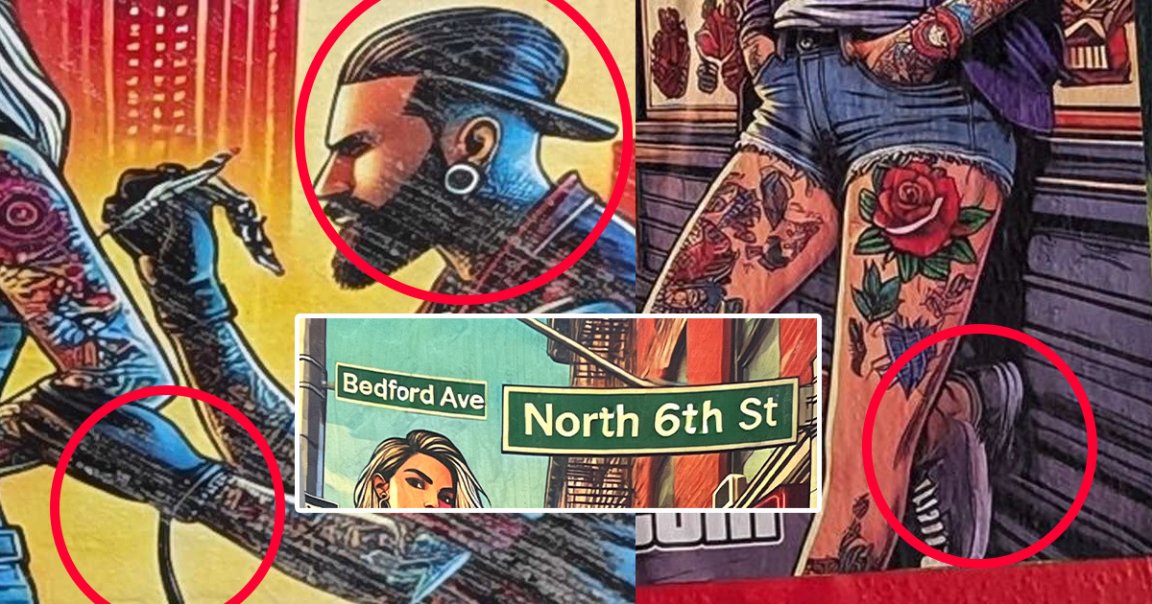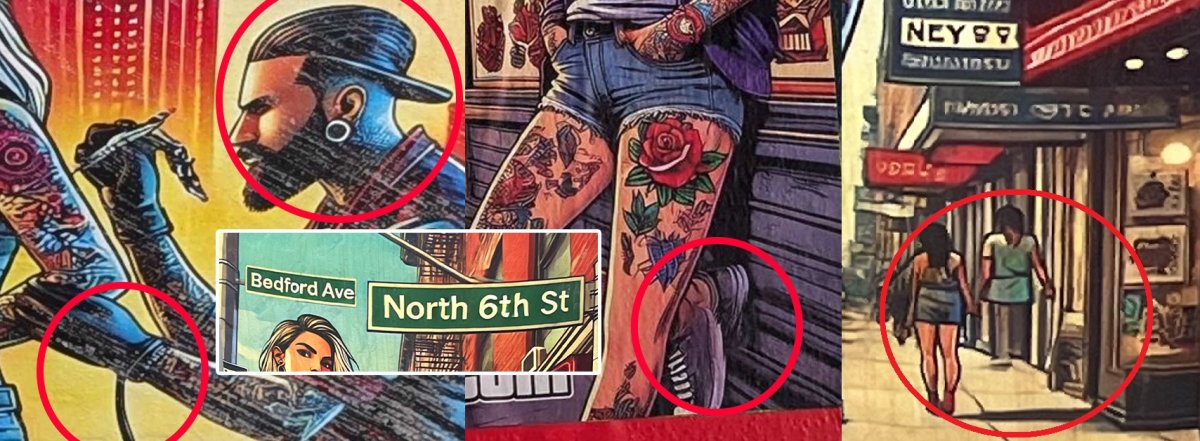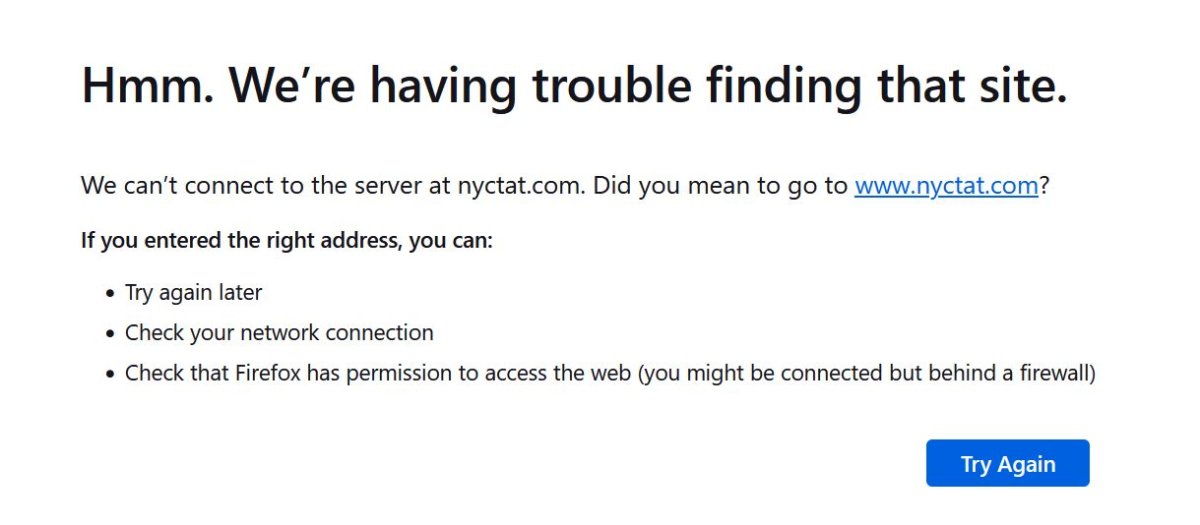
Over the summer, a storm of obviously AI-generated posters for a chain of tattoo parlors started to appear in parts of Brooklyn and Manhattan, slathered onto trash cans, light poles, and scaffolding.
The posters — which rip off the lettering and style of the Grand Theft Auto video games — depict heavily inked women with pouting lips to advertise wildly cheap tattoos for just $44 apiece.
They’re also astonishingly garbled. One of the women has a mysterious third foot. Fingers are morphed and mangled. A tattoo artist’s slick-backed hair seems to mutate into a baseball cap, and a power cord connects to his arm instead of his tattoo gun. One poster’s skyline appears to feature three separate Empire State Buildings. One woman has no legs, appearing simply as a floating torso. And the tattoos themselves are an ambiguous jumble of fuzzy blobs that invoke a tattoo-ish vibe without much in the way of any real detail.

And in a crowning achievement of incoherency, the website listed on the scores of posters — nyctat.com — returns an error message.

It’s no longer uncommon to see AI-generated content on the web. Facebook is filled with AI slop and Google is polluted with AI blogs, reviews, and even fake versions of real historical events and artwork.
But it’s still less common to see blatantly AI-generated imagery in the real world. And its use by a tattoo parlor is particularly striking given the inherent intimacy of the art form. We couldn’t help but wonder: is the imagery this shop is tattooing on customers also generated using AI? If so, do the customers know?
Digging deeper, more questions emerged. What appeared to be the chain’s actual website — nyctattooshop.com, not nyctat.com as shown on the posters — featured a “Meet our Team” page populated by stock images of people whose names don’t appear to correspond to actual employees. A section of the site called “tattoos,” where you’d assume it would show samples of its artists’ work, simply describes various types of tattoos at great length, in language that also sounds suspiciously AI-generated.
The website did list addresses for three locations, though. So to learn more, we hit the pavement.
Starting at the Manhattan address, no one answered that location’s callbox or listed phone number. Then we made our way over to its Williamsburg spot, where — with the hint of a smile — an employee said they knew little about the posters, but thought AI might have been used to make them.
Finally we wound up at the location in Greenpoint, where an artist passed along the phone number for an owner named Mark. But before we left, we asked the same artist whether she personally would’ve used AI to draft advertisements for the shop.
“I probably would have hand-drawn it,” the artist told us. After pausing, she caveated: “But whatever grabs the attention.”
After a few efforts to get in touch, Mark — full name Mark Briggs — picked up the phone, confirming that he’d used OpenAI’s ChatGPT to generate the art for the posters.
“I was just trying it out for all different things to see what you can do with it,” Briggs told us, adding that he didn’t “specifically go out to make these on ChatGPT. I was just, like, trying stuff out. And it made a poster.”
But Briggs, who says he’s one of “a couple” owners who manage the tattoo chain, didn’t have great things to say about the process. He found that the “buggy” AI wouldn’t generate quite what he was asking for, lamenting the illegible words and mashed-up fingers. What eventually ended up printed on the posters, he claims, had to be heavily edited in Photoshop.
“To tell you the truth,” he said, “it took pretty much all day. It wouldn’t get it right. So it’s not really a viable solution.”
Do Briggs’ shops use AI to develop tattoo designs? No, he said.
“We don’t use any of that,” he told us, declaring it would “definitely” be “unethical for artists to even claim the work as their own or not disclose it if they’re, you know, heavily using” generative AI.
But then he started talking about a service called Co:Create’s “Concept Generator,” which promises to turn users’ tattoo ideas “into a visual concept by sharing your vision, style preference, and placement.”
“It definitely gets the client’s ideas on paper better,” Briggs said of the AI service, though he added that “depending on what they [a tattoo client] want, different styles don’t come out right. Stuff like that.”
Briggs had little concern for questions of copyright and artists’ rights. When we brought up the fact that AI models including ChatGPT have been trained on copyrighted artworks without compensation or consent from artists, Briggs pushed back on the idea that his posters might cross any copyrighted red tape, arguing that OpenAI’s chatbot will refuse to generate images when it finds an “idea is copyrighted.”
That’s partially true. If you ask ChatGPT to spit out an image in the style of a specific artist, it’ll usually decline, citing content policies. But that function doesn’t always kick in — and even when it does, it’s pretty easy to find workarounds. Regardless, considering that generative AI models like text and image generators were trained on an incredible amount of scraped data, legal experts widely agree that generative AI models like text and image generators collectively present serious and yet-to-be-resolved intellectual property concerns.
When pressed, Briggs maintained that he doesn’t believe the quality of the AI art used for the posters reflects the quality of work done by the human artists who work at his parlors. (Though NYC Tattoo Shop’s website still doesn’t mention any real employees, the “Meet our Team” section populated by fake ones disappeared after we started asking questions.)
“The quality” of AI outputs “is bad,” Briggs told us, but the “time it takes is shorter. Our tattoo artists take a lot of time in their work, so their quality is very high. But AI, the quality is really low… it only took a couple of seconds to draw something that would take a human probably two, three days.”
Oh, and the broken website? Briggs said that it works if you add a “www” before “nyctat.com” — though when was the last time you did that? — and the website does work on some browsers without the “www.” It still doesn’t load on Firefox.
New York Magazine‘s John Herrman recently reflected on the growing ubiquity of AI, writing that the term has become shorthand for “things that just sort of suck,” like mind-numbingly formulaic professional emails, an imitative straight-to-streaming movie, or a dull new album that feels like algorithmic drivel. These posters, with their three-legged women and incoherent scribbling, certainly fall somewhere in that bucket. AI might enable you to whip up marketing materials or web content on the fast and cheap, but the current state of the tech means the results will also look fast and cheap.
During our conversation with Briggs, we raised the question of whether there might be an implicit tension between the AI-generated images used to market his parlors and the deeply human nature of tattooing itself. He wasn’t worried about any dissonance.
“The thing is, it wasn’t made 100 percent by AI because it’s so glitchy,” he said. “The posters aren’t any kind of designs — it’s just, like, a street scene of the store. It’s not actually something that someone will want to tattoo on their body, or that we’re offering to be tattooed.”
NYC Tattoo Shop’s Instagram feed showcases dozens of tattoos from a rotating roster of artists with distinct styles. Some feature thick lines and bold color; others are quieter, black-and-gray line drawings and shaded portraits; some are lively and cartoonish. And most importantly, there aren’t any uncanny errors, like mystery feet and mutated hands, to be found.
But you wouldn’t know that from the posters.
More on AI: OpenAI’s New “Strawberry” AI Is Still Making Idiotic Mistakes